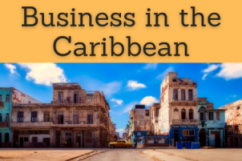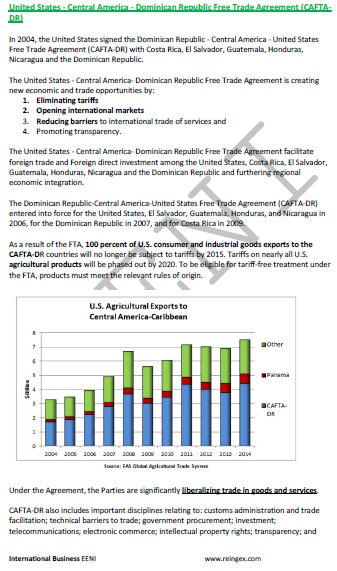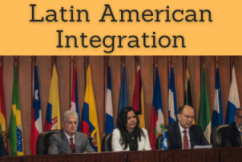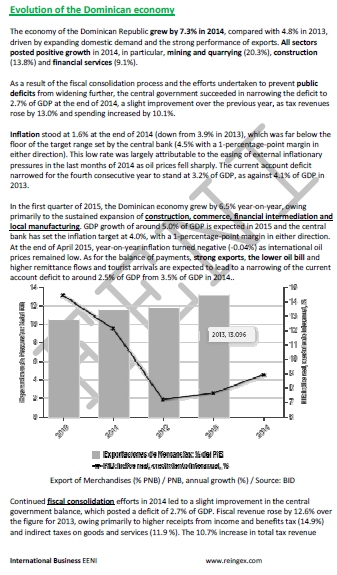Business in the Dominican Republic, Santo Domingo

Dominican Economy and Foreign Trade. Tourism, services, agreements, free zones
- Introduction to the Dominican Republic
- Business in Santo Domingo
- Dominican Economy
- International Trade of the Dominican Republic
- Case Study:
- Trade Relations with Chile and Canada
- Brugal
- Access to the Dominican Market
- Business Plan for the Dominican Republic
The objectives of the subject “International Trade and Business in the Dominican Republic” are the following:
- To analyze the Dominican Economy and Global Trade
- To know the trade opportunities in the Dominican Republic
- To explore the Dominican trade relations with the country of the student
- To know the Dominican Trade Agreements
- To examine the profile of Dominican Companies
- To develop a business plan for the Dominican Market

The Subject “Foreign Trade and Business in the Dominican Republic” belongs to the following Online Programs taught by EENI Global Business School:
Masters: International Business, Foreign Trade.
Doctorate: American Business, World Trade.

Languages:  or
or  Repúbliba Dominicana
Repúbliba Dominicana  Repúblique Dominicaine.
Repúblique Dominicaine.
- Credits of the subject “Doing Business in the Dominican Republic”: 1

- Duration: one week

Masters adapted for Caribbean students.
International Trade and Business in the Dominican Republic.

The Dominican Republic Trade Agreements and Market Access.
- The Dominican Republic and the Latin American Economic Area
- Central American Integration System
- Association of Caribbean States
- Latin American and Caribbean Economic System
- Trade Agreement with the U.S.
- Dominican Republic-Central America Agreement
- Mesoamerica Project
- UK-CARIFORUM Free Trade and Economic Integration Agreement
- CARICOM (Observer State)
- Trade Agreement with the CARICOM
- ALADI (observer)


- WTO
- GATS
- Agreement on the Application of Sanitary Measures
- Agreement on Technical Barriers to Trade
- Agreement on Preshipment Inspection
- Agreement on Safeguards
- Trade Facilitation Agreement
- Hamburg Rules (Sea)

- Inter-American Development Bank
- OAS
- ECLAC
- East Asia-Latin America Cooperation
- CELAC

- UN
- WB
- WTO
- IMF
- The capital of the Dominican Republic is Santo Domingo
- The Dominican population is 9.9 million people
- Area of the Dominican Republic: 48,311 km²
- The official language of the Dominican Republic is Spanish
- The Dominican Republic gained the independence from Spain in 1821
- Abolition of Slavery in the Dominican Republic: (1804)
- Toussaint Louverture
- African Diaspora in the Dominican Republic: 8.7 million people (84% of the Dominican population)
Religion in the Dominican Republic: Catholicism (Christianity).

The Dominican Republic belongs to the Western Civilization (Latin American Economic Area).

The Dominican Economy and Foreign Trade.
- The services sector is the pillar of the Dominican economy (55% of the GDP, the largest employment generator)
- Other significant Dominican economic sectors are free trade zones, tourism, telecommunications, and construction
- The tourism sector represents more than 1,000 million dollars annually
- The Dominican economy is closely related to the foreign direct investment from the U.S.
- The economic slowdown due to the impact of the international financial crisis
- The economy of Santo Domingo (capital) is based on services and industry and represents a GDP of 30 billion dollars (Purchasing Power Parity)
- The Dominican financial sector is strong and is one of the largest in the Caribbean region
- In the Dominican Republic, Exports were reduced by 231 million dollars mainly due to the fall in exports of ferro-nickel, as a result of international nickel prices reduction. All this led to the temporary closure of the company Falconbridge
- The Dominican Republic has one of the most advanced telecommunications infrastructures in Central America, open to the foreign direct investment
Business in the Dominican Republic

Brugal is one of the largest companies in the Dominican Republic. in the recent years, Brugal has begun a process of strengthening its presence in international markets, to increase the exports and guarantee its continued growth process.
(c) EENI Global Business School (1995-2024)
We do not use cookies
Top of this page


